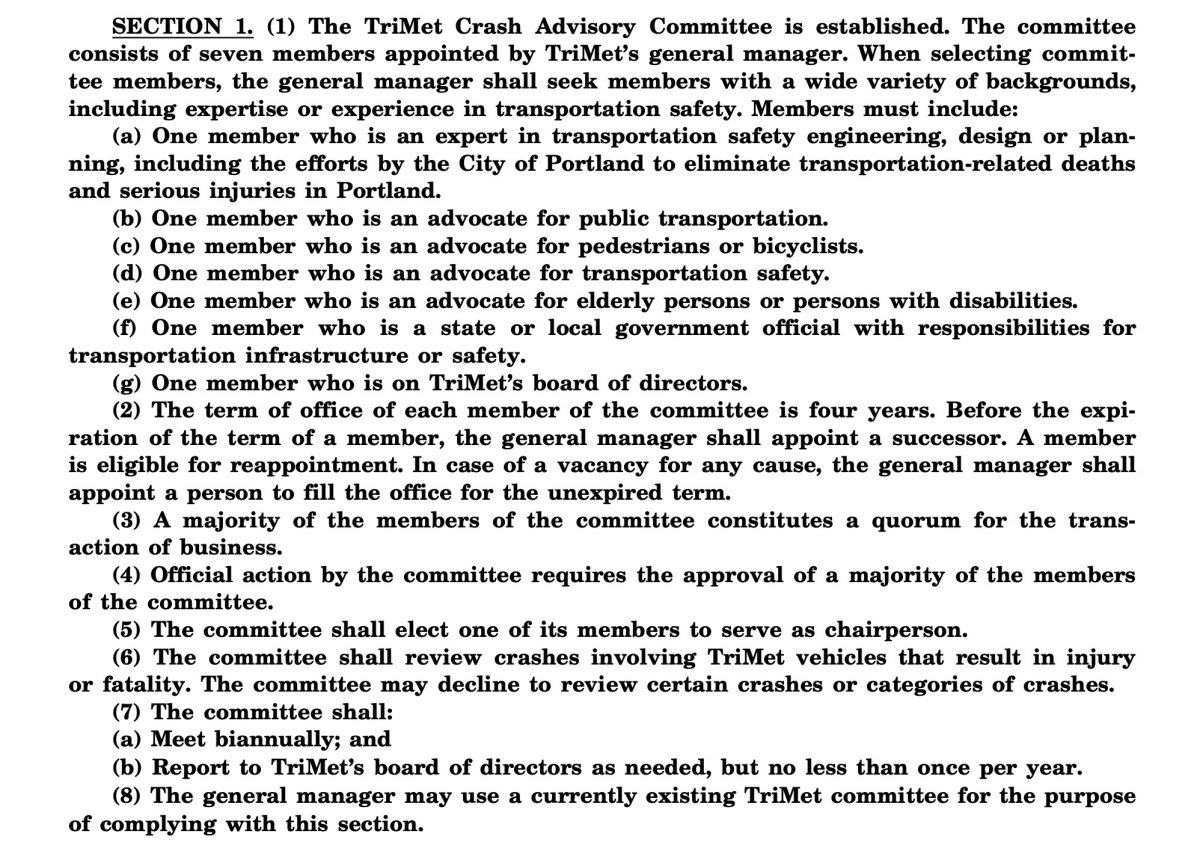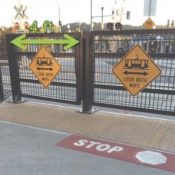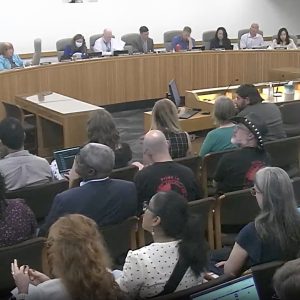
(Photo courtesy Darla Sturdy).
The dogged determination of one advocate has forced TriMet to create a new committee to review all injury and fatal crashes involving their vehicles.
Darla Sturdy, a volunteer with Families for Safe Streets, turned anguish over her son’s death in 2003 into activism that has now led to passage of two bills through the Oregon Legislature. In 2007 she passed a bill requiring TriMet to study and create recommendations for how to make dozens of light-rail crossings safer. That bill became law four years after her 16-year-old son Aaron Sturdy-Wagner was killed while biking through one of them.
And on June 30th of this year, Sturdy’s bill passed just one hour before the end of the session. Senate Bill 1053 establishes a seven-member TriMet Crash Advisory Committee. Originally intended to be completely independent of TriMet with members appointed by the Oregon Transportation Commission, the final bill allows the agency’s general manager to appoint the members. The bill also mandates that committee members must come from a wide variety of experiences and professional expertise including: a disability rights advocate, a biking and walking advocate, a government agency staffer, a vision zero expert from Portland, and a TriMet board member.
“They didn’t want to do it… Then I said, politics or lives?”
— Darla Sturdy
Sturdy fought for this committee because she doesn’t trust TriMet. “TriMet judges their own accidents,” she repeated to me several times on the phone today. It’s true. Until now, the agency has always investigated themselves when one of their light rail or bus operators hurts or kills someone.
Reached today on the phone, Sturdy said it took six months of work to pass the bill. It died twice and went through three bill numbers before it was signed by Governor Kate Brown last week. At each step, Sturdy didn’t take no for an answer. “I probably met personally with all but four legislators in that building,” she told me today from a conference she’s attending in Dallas. At one point Sturdy asked her House representative to do a “bill pull” — legislative jargon for pulling a bill directly out of committee for a vote on the floor — something that’s not done very often. “They didn’t want to do it because other lawmakers might frown on it,” she shared. “Then I said, politics or lives?”
Advertisement


(Photo: J. Maus/BikePortland)
Eventually Sturdy’s relationships paid off and she was able to get her bill on the floor. It passed unanimously an hour before the gavel came down for good.
“I knew God would take me to the end, but I didn’t realize he’d take me all the way to the last hour,” she said with a laugh.
Sturdy knows her work isn’t done. This unrelenting advocate was at TriMet’s Board Meeting last night. “I looked at the GM (Doug Kelsey) and said, ‘You’re going to be picking this committee’. And I told the board, ‘You better make sure they come from the outside’.”
For their part, TriMet was officially neutral on the bill. In a letter to lawmakers dated June 19th, the agency’s director of government affairs, Bernie Bottomly wrote, “We would like to express our reservations regarding the potential ramifications and unintended consequences of the proposed legislation… TriMet concerns relate to how this legislation may conflict with other requirements placed on the agency by both state and federal law regarding safety Management and reporting, civil liability mitigation, privacy rights of employees, attorney-client privilege and public records.”
In the end, Sturdy hasn’t lost sight of why she devotes so much of her life to this fight. “My son would be proud of me. He had a saying, ‘Dream big, don’t let the little things get in your way.’ To me that meant I can’t save him, but I can save others,” she said, holding back tears. “That’s what it is. To make that change, make it better. I believe we all have a purpose and I found mine in safety advocacy.”
— Jonathan Maus: (503) 706-8804, @jonathan_maus on Twitter and jonathan@bikeportland.org
Never miss a story. Sign-up for the daily BP Headlines email.
BikePortland needs your support.







Thanks for reading.
BikePortland has served this community with independent community journalism since 2005. We rely on subscriptions from readers like you to survive. Your financial support is vital in keeping this valuable resource alive and well.
Please subscribe today to strengthen and expand our work.
Meanwhile… is anyone looking into car crashes?
Why, yes. Both the Oregon Transportation Commission and the Federal Highway Administration. In logical response to increasing car crash rates, they are making cars stronger and encouraging the construction of more exclusive freeways and higher speeds, to discourage pedestrian use of highways. Why do you ask?
Don’t forget the partially-automated driving systems that encourage additional driver distraction.
Looking into crashes is always a good idea, whether it was an airplane, train, bus or car. It’s especially worthwhile for TriMet because its vehicles encounter (and sometimes create) the same problems over and over, and fixes may be applicable to multiple similar locations (e.g., station design improvements). It’s super impressive what Darla has achieved through her dedication and advocacy. Congratulations. Now let’s make this a good thing.
As a MAX operator I question what results this will have. More bureaucratic minutia or real, significant change that Ms. Sturdy so clearly desires.
TriMet needs to get real about upgrading crossings throughout the alignment. Times have changed. The sheer quantity of electronic distraction and mental health issues we see daily is staggering and makes the job incredibly stressful and ends up slowing down the system. Waiting for another death or injury seems reactive. I can go into great detail but scattered throughout the system are the vestiges of every accidental MAX fatality, areas where we have to go super slow. The hilarity is that we only do this where someone was killed. So, with enough time, basically the entire system is going to have these special speed zones and crossing treatments unless they step up and make more active crossings and barriers.
The whole point of light rail, streetcar, tram, BRT, & trolley is to create a fast rail system for a fraction of the cost of an exclusive right-of-way system like subway or Skytrain, usually more for redevelopment purposes than for moving people. This is the natural consequence of the those cost-cutting measures: more crashes, more injuries and deaths by intersecting users, slower speeds. On the long run, these cheaper systems ultimately need to be upgraded to the higher-priced systems.
Actually, most of our system is exclusive ROW. The only area it is not is Tillicum Crossing and approaches. I think what you mean is grade-separated. Part of the reason MAX runs on surface streets was strategic. By the late 70s downtown Portland was pretty dead and they thought having all these people on the street and passing through and seeing shops and cafes would enliven the core. That has succeeded beyond all measure. The entire system of planning and urban growth was predicated on downtown being the destination. All transit was and is still routed through downtown. Works great if you are going to downtown.
I’d be curious to hear about the top areas you feel are speed restricted for these safety reasons, vs. track geometry or signals. A few I can think of:
1. The area around Saturday Market
2. Rose Quarter
3. Approaching Lloyd Center
At some point, can we have a reset, and try to speed up the system by eliminating these zones?
Chris, here are just a few off the top of my head: WB into Millkan Way (15mph), WB into Hawthrorne Farm (15mph), EB into Civic Dr (15mph) all of these are due to incidents and are silly.
The height of absurdity is the 5mph WB into Sunset TC due to a temp pedestrian crossing being in use for a 6 month elevator project. Adds about a 1.5 min to each trip. And to think closing those three platforms downtown will save, what? 4.5 min? Just getting the signals to work better along Morrison would save a couple of min. It really is absurd.
Personally, as both a pedestrian and cyclist, I much prefer active crossing arms to push-gates or “zee” crossings which force you through a slalom of fences in order to cross.
Crossing rails calls for looking both ways. Otherwise, ***portion of comment deleted for insensitive word choice***. Other countries who’ve had light rail for decades don’t have this problem. You can’t protect people from themselves.
It’s more accurate to say that other countries don’t report pedestrian crashes and injuries from light rail. However, it isn’t at all difficult to find local crash articles through Google for any city that has light rail anywhere in the world. Basically foreign agencies are just as likely as TriMet to sweep such issues under the rug – no one likes to take responsibility for causing any deaths.
Her son was killed crossing a fixed track train. He didn’t even bother to look to see if a train was coming. So far she has managed to force tri met to build those mazes that you have to go through to cross the tracks and to place signs telling people to look both ways when crossing the tracks. Her son didn’t die from a train that swerved into him. Her son died because he didn’t even make an effort to see if it was safe to cross. Somehow she has always tried to make it tri met’s fault?
Now tri met needs to spend a whole lot more money?
So I went and looked for more. Her son made eye contact with the driver of the train and I guess figured that a massive, heavy train would stop for him to get in front of it? The family sued and got nothing. A court even put the blame on the son, but she is on a crusade to put the blame on tri met.
@Mike Quigley would you look a person in the eye and tell them their loved one died because of “Natural Selection”? @billyjo you don’t know the first thing about what Aaron “figured” in the moments before he was killed riding home from youth group. Your dismissive tone doesn’t add to discussion about crash reviews, or double threat crossings which continue to cause a disproportionate number of crashes (street and rail) each year.
the crash was reviewed by a court and the court made a decision. There is a point where all these “improvements” are nothing but encumbrances for all the rest of us.
Holy crud Billyjo and Mike Q – she’s trying to make sure another parent doesn’t a lose a child the way she did. Your comments read like O-live garbage.
I am sorry that is how you see it. Her son was killed. As a result she has become an advocate. As an advocate, and as someone with a specific agenda, people are allowed to disagree with her. We are talking laws that affect people. She is responsible for the mazes and gates that you have to go through to cross max tracks. Mazes and gates that every day, people with bikes or in wheelchairs have difficulty with. These gates negatively impact people’s lives. Stand at a platform with these for just a few hours and watch how many people do dangerous things to avoid them. For those people, these mazes are making the crossings less safe. But you think we should just suck it up so that she can “try” to save some other family from her pain? What if the money wasted on these 2 ideas were instead used to educate people about physics? A train cannot stop on a dime just because there is suddenly a person there. Perhaps if you took emotion out of it, and looked at the actual proposals logically, you too would see that these are only costing more money that could be used for better things.
When I started helping with Families for Safe Streets, I had reservations about Darla’s case because I’m a big believer in public transport, and I didn’t want to advocate against that.
However, Darla’s point that TriMet shouldn’t oversee investigations of its own crashes is a no brainer. These investigations need independent verification, otherwise they have no credibility.
I was disappointed that TriMet managed to water down the final version of the bill by putting its own general manager in charge of nominating committee members. You can’t help but wonder, what is TriMet afraid of? If they’re confident in the integrity of the investigations, why not submit to purely independent, third-party oversight?
TriMet has fought this every step of the way, and it’s disappointing to me that the operator of this city’s PT system couldn’t have found a more cooperative, constructive way to work on safety issues with Darla and rest of Families for Safe Streets.
I support public transport in principle, but this particular operator has not done much to win my confidence.
Hopefully this is a step closer to getting actual automated arms instead of just a zig-zag or those awful manual gates.
The problem is that TriMet is putting in these pedestrian crossings away from the road where the counterweights for the streets arms usually swing up to partially obstruct the roadside sidewalk and give a natural deterrent. They should put in automated arms if they’re going to create a mid-track crossing away from the already installed automated street arms.
As usual motor vehicles get all the safety improvements and vulnerable users are left in an unsafe environment.
Yes, you should look both ways before crossing. But why don’t drivers need to? It’s obviously not that difficult to install automated arms and keep people safer, in all modes.
I was coming off the west bound sidewalk, on Hawthorn bridge. On that particular day, I was wanting to cross the car lanes and get to the left side to exit on 1st ave. I know this is very common for bikes to do. A bus was barreling down the bridge and despite my position in front of it, it did not yield to my right of way.
Upon contacting the dispatch desk via email I was told, “Tri Met buses don’t have to yield to anyone”. This informs me that Tri Met is a horribly toxic environment, if you are not a bus driver. Even if you are a bus driver, I imagine.
The irony of this story.
I’m unclear on this scenario with respect to the right-of-way.
You were already in the right-hand auto lane (to the left of the bike lane) with forward right-of-way and the bus coming from behind you seemed like it was going to run you over so you went back to the bike lane?
Or:
You were still in the bike lane and signalling (or not, doesn’t matter) to get into the left auto lanes and traffic wouldn’t yield their forward right-of-way to let you in?
Speaking of legislation, when is the Governor going to sign the stop sign law?
What a farce! You never even contemplate what it’s like, from our perspective. Shame on you all.
https://fromthedriverside.blogspot.com/2019/09/investigate-me-go-ahead-inept-boneheads.html
@Deke
That blog was quite the rant… so you found this article here (BikePortland), then you talk about how everyone is afraid to blame the victim after a collision. Seriously? You obviously don’t read many articles here (or read/watch the news in general much). There’s a reason most people believe that ped’s/cyclists are more to blame for collisions with cars than are drivers, even though the stats tell something different.
You also seem to take offense at the notion that bus operators are held to higher standards than other motorists. Um, yeah! You’re driving one of the heaviest/longest/widest vehicles on the road – little mistakes are amplified. If you think that’s not fair, you should choose a different occupation. Sure, standards for regular motorists SHOULD be increased (especially for other “professional” drivers like Uber and Lyft), but that shouldn’t remove the amount of scrutiny those in your profession are subject to. Speaking of scrutiny, I hope you can look back and see the irony in your argument about third-party investigations not being impartial compared to internal investigations. You make some valid arguments about how those within the organization could have a better understanding of what’s involved, but come on man, inferring that they’d be more impartial?
The air of superiority coursing through your writing fails many of your arguments, some of which are indeed valid. The many miles driving with an elevated view afforded by raised vehicles seems to also elevate one’s opinion of their own driving skills, as evident by the behavior of all the jacked-up pickup drivers out there. You could very well be a good, attentive driver, but sitting up high on your throne, you also become very disconnected from the environment you’re driving through and the people therein. Try cycling or walking any significant distance along a bus route for a few days and see if your opinion of bus drivers doesn’t change at least a little. Not saying all of them or even most are bad, but even the good ones can have bad moments (just like ped’s/cyclists, we’re all human). But you seem to consider yourself infallible, and above the scrutiny of those who haven’t done your job. I can sympathize – I spent several years overseas loading large explosive ordinance onto $40+ million aircraft being directed by people who didn’t even know how the ordinance was armed or how it was secured to the aircraft, much less all the safety procedures we had to follow. But the attitude conveyed in your blog is not only arrogant but dangerous.
Ryan,
I can see where you might feel I was a bit over-the-top in the blog, but no I do not ever consider myself “above all” in driving skills. Just far and above the average personal motorist, and that’s as it should be.
You’re correct in that my beast of a bus is a huge responsibility to operate, and I do so with great care. I have ridden a bicycle among cars, trucks and bicycles and I can tell you that long before I took this job, I trusted bus operators MUCH more than the average motorist. Operators are trained to see you, and must be annually recertified. How often do private motorists have to be certified? Once. I am more “connected” with the environment in which I operate than 90% of anyone else on the road. My eyes are constantly scanning for danger. When I’m not accelerating, my foot covers the brake. The longer we’re out here, the better we become at predicting driving behavior in others.
I do not consider myself infallible… anyone who drives a bus knows this is too dangerous a folly. My blog was written after reading Mr. Maus’s words of how bus drivers “kill” people. That pissed me off, thus the tone of my post. The “air of superiority” is just. We are professionals who watch out for ALL others we share the road with. Many people just do not follow the rules, and I see it throughout each shift I drive, every day. You can scrutinize me all you wish, but I have driven a bus about 150,000 miles without (God forbid) making contact with anyone else on the road. How many private motorists can say this? Maybe half.
If we were to meet, you’d see that I’m anything BUT an arrogant. I care so much that I have a bad habit of going overboard when incensed. Sometimes, my writing is meant to stir the pot, because the majority of people on the road are the arrogant ones. They cut people off, run red lights, ignore many laws, and put you and others in danger. It frankly pisses me off, because the LAST thing any of my brothers and sisters want to see is people being hurt. When they are, you can be assured the bus operator who witnessed the accident is the first to summon emergency help, will stay and provide a statement of what happened, and be the responsible one. So many times, private or commercial motorists will err in visual measurement and smash our mirror, then speed off. We’re responsible “out there,” and we DO care.
We save countless lives every day by our vigilance. Nobody ever hears about it, because only blood catches attention. “Dirty Laundry,” Don Henley sang.
So yeah, I stand by my statements. They are derived from 50 years of driving without an accident, and only two citations in that time. I take driving very seriously, whether in my own car, on a bike, walking or driving a bus. Like you said, being human means we will make mistakes. But hey, at least we’re aware of them and take action to avoid them in the future. We’re serious about our job, and that is to keep YOU safe, whether you help or not.
Every day I walk out to my bus, I say an 11-point mantra to preface my shift: “Be Safe, Kind, Courteous, Thoughtful, Polite, Patient, Vigilant, Calm, Smart, Smooth; but above ALL, Be Safe!”
Peace be with you, and I wish you safe and pleasant riding.
db
Thank you Deke.